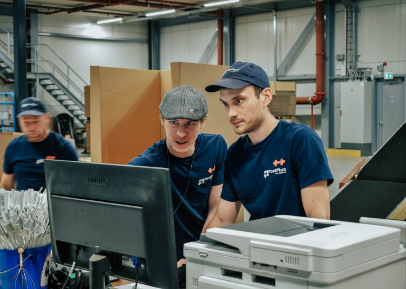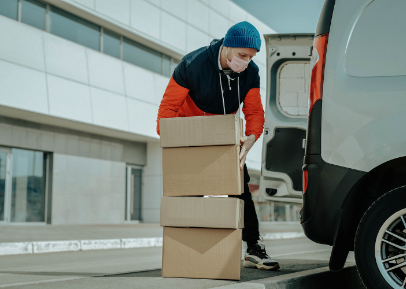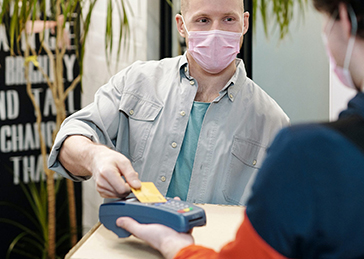
Big changes are on the horizon, and we’re excited to share them with you! At PostPlus, we’re constantly striving to innovate and improve your experience. That’s why we’re thrilled to announce that starting from September, we will be transitioning to our new and improved domain: post.plus.
Why Change?
Our goal has always been to enhance the accessibility and usability of our services. The new domain, post.plus, is not just a change of address; it’s a step forward in our ongoing journey to provide excellence in logistics and customer service. This sleek, memorable URL is easier to remember and faster to access, ensuring you can find what you need when you need it without any hassle.
Looking Ahead
The launch of post.plus is just the beginning. We are committed to continuous improvement and are excited to roll out additional features and enhancements that will further improve your experience. Keep an eye out for more updates and features that we believe will set new standards in the logistics industry.
New Email Addresses
As part of our move to a new digital home, our email addresses are also changing. Soon, all our communication will come from addresses ending in @post.plus. This change will help streamline our communication process and ensure that you continue to receive timely updates and responses from us without any disruption.
Thank you for your continued support and enthusiasm. Your trust in us fuels our commitment to innovation and excellence. Let’s move forward together!

Emmerich am Rhein, 01. December 2022 – The PostPlus Group is focusing on the Germane-commerce market in 2023. The international logistics provider is further expanding its global multi-carrier network of national mail companies and parcel service providers. This step has already been completed in many European markets in recent months. PostPlus develops bespoke end-to-end delivery solutions for international online retail. Always focused on its customers’ needs, the Group offers customers individual service and negotiates the best possible price with mail companies and parcel service providers. The Group aims to establish itself as an independent mail and parcel service provider in Germany next year.
“In deliveries, our focus is on speed, reliability and flexibility. We have prepared ourselves for the Christmas peak early, so that we can help online retailers shine with excellent fulfilment, especially at this time,” says Sven Schwope, Managing Director of PostPlus Deutschland GmbH. For next year, PostPlus has set itself the goal of becoming the most customer-oriented mail and parcel service provider for international logistics in Germany and the EU.
To achieve this, the logistics service provider is using the specific needs of its customers as the basis for developing a modular solution with fixed rates, regardless of the destination country and type of delivery. Various tracking and additional options can also be booked as options. “As well as a bespoke, flexible logistics solution, we also guarantee personal support,” says Schwope. PostPlus sees transparency as the key here: A modular IT system makes all shipment, tracking and tariff information available in real time, at all times.
E-commerce retailers benefit from no longer having to research, contact and negotiate contracts with shipping providers individually – a process that often requires numerous different communication systems. Now, PostPlus does it all, says Mihhail Rutenberg, Chief Commercial Officer (CCO) of the PostPlus Group: “Our customers get everything from a single source with us, so that they can concentrate fully on their core business. We develop an individual concept for them and find the best possible tariff.” That makes it possible to ship parcels in large quantities securely and at low cost, he argues.
PostPlus currently ships up to three million parcels and printed documents per month. To conduct this shipping, the logistics provider uses a global multi-carrier network consisting of air freight and CEP service providers, mail companies in the destination country and other local service providers. “PostPlus is able to combine different regional providers to form a bespoke national solution that covers every area of the country. That is the advantage that the “Plus” in the name represents. In 2023, we plan to expand our network to include further partners in Germany, just as we have already done in large parts of the EU,” says Rutenberg. After all, delivery by the state postal service is not always the ideal solution. Independent, specialist logistics providers are often a better choice, says the CCO. “With us, our customers are free to choose and can switch at short notice where necessary.” The Group also has its own terminal close to Amsterdam Airport, acting as a central hub for international post and parcels.

Sven Schwope is the new Managing Director in Germany. The principle he believes in is: “It all starts with trust. In this short interview, you will find out why and what motivated the logistics expert to support PostPlus.
You have been working in the logistics industry for almost 20 years. How did that all happen?
After finishing my A-levels and doing my civilian service, I started an apprenticeship as a Management Assistant in Digital and Print Media at the Bauer Media Group in Hamburg. During that time I was able to get to experience the logistics area of the publishing house, and it became clear that I wanted to continue working in that area. After the apprenticeship, I started in the logistics department of Bauer Vertriebs KG and worked there for seven years in various positions, such as a team leader in order processing. At the same time, I studied business administration on the side. After that, I worked for more than ten years at International-Mail GmbH in Hamburg in various management positions. My last position was that of the General Manager Europe. During my time at International Mail GmbH, I was mainly responsible for the European market. Together with my team, I was able to transform the company from a mail delivery service provider for international and national letters, magazines and catalogs to a cross-border e-commerce provider for goods and parcel shipments.
Why did you decide to work at PostPlus?
The trusting relationship between service provider and customer is extremely important to me. The gut feeling has to be right. And it definitely feels right at PostPlus.
Everyone at the company is highly motivated and wants to achieve the best possible outcome for customers and partners. The opportunity to contribute my own ideas and implement them in a very short time is what I was looking for in terms of successful growth. I am driven by the passion to be there for our customers and partners every day and to optimize current processes as well as to successfully realize projects together with them.
How do you help PostPlus customers and partners?
My vision with PostPlus is to become the most trusted independent postal and parcel service provider for cross-border logistics in Germany and the EU. For me, trust is the basis for sustainable business growth and inspiring customer relationships. I would like to offer our support to all online retailers and companies in Germany and the EU who are looking for growth opportunities through the international movement of goods. The fact that the PostPlus concept works has been clear since the second operating year: we were able to deliver over 25 million cross-border items for our customers across Europe and worldwide. I would like to expand this success story in Germany as well.
What do you see as the biggest difference between PostPlus and other logistics providers?
We work in a customer-oriented way. By combining postal and non-postal products, we can offer individual cross-border delivery solutions and switch from one service provider to the other in real time if necessary. In doing so, we are 100 percent independent.
We focus on ensuring the best possible customer experience. To achieve this, we keep all management levels operational. In addition, we offer short-term testing opportunities for our services before companies decide to partner with us – true to the motto “It all starts with trust”.
Thank you for the interview and welcome to the team!

Europe is one of the world’s main e-commerce markets.
One recent estimate suggested that, during the course of 2021, orders worth about €392 bilion ($465 billion) will be placed online by consumers across the continent (https://internetretailing.net/rxgeu/rxgeu/european-ecommerce-revenues-jump-30-to-us465bn-in-2021).
Our dependence on e-commerce has, of course, only increased during the Covid pandemic, particularly because lockdown measures in many countries meant that high street stores were closed.
The biggest proportion of sales may have been placed by shoppers in the UK, Germany and France.
However, domestic and international brands are also seeing a rapid rise in online orders placed by people living in other territories.
It is one of the reasons why in launching PostPlus two years ago, we decided to concentrate on offering retailers a better, more reliable and – in many cases – quicker way of engaging with consumers in the Baltic states, Scandinavia and Eastern Europe.
Myself and my colleagues have a lot of experience in quite literally delivering excellent service in all of these areas.
That in-depth understanding of national, local and even hyper-local logistics is quite critical in ensuring fast, effective consignments for e-commerce companies both within and far from Europe.
After all, consumers in the countries to which we ship may use different currencies and speak different languages but they have exactly the same needs as their counterparts in the bigger and more established European markets.
As I’ve been telling Post & Parcel, one of the world’s leading supply chain publications, our approach has struck a chord with our clients and their own customers too (https://postandparcel.info/141334/news/postplus-set-for-further-expansion/).
Within two years of PostPlus starting to trade, we are now handling more than 200 tonnes of packages per month – parcels, packets and printed materials – on behalf of a growing number of businesses.
We now deliver to more than three times as many countries as when we started and, as a result, have seen a substantial rise in our turnover.
Nevertheless, the real measure of our success is the speed and accuracy of our shipments.
Even though ‘bricks and mortar’ stores in the world’s towns and cities are now open to consumers once more, we believe that the appetite for online shopping is now a constant.
In order not only to maintain but to improve our standards of service, we plan to make significant strategic investment to enable our clients to grow sales.
Furthermore, we understand that whilst national postal operators possess trusted capabilities in the important final mile of delivery, sometimes other smaller, local couriers can offer even better quality in some destinations.
As the volumes which we handle increase, so too does the workload for our innovative delivery partners.
With the amount of e-commerce sales outside Europe’s ‘big three’ markets growing, I believe that online brands will continue to place even more of a premium on local experience, expertise and excellence, and that is what PostPlus aims to deliver every time.

As we promised we took the pulse on our newest team member of PostPlus – Bjorn Moberg Head of Global Business Development and we were giving to him few questions what we thought could be interesting for you.
Please introduce yourself and why you joined PostPlus?
“First of all thanks for the warm welcome to PostPlus. My name is Bjorn Moberg, and I am very proud and happy to be part of the fast-growing global PostPlus Team. I joined PostPlus in March, earlier this year, and I am very impressed by PostPlus’ customer-centric approach, and my colleagues’ enthusiastic attitude to do the utmost to help existing and new customers to move their small packages over country borders, directly to online consumers in key e-commerce markets – what we at PostPlus refer to as – “We Deliver Happiness”.
Before joining PostPlus, I have held several management positions within the e-commerce logistics industry. Throughout 15 years in the industry, I have managed and been in charge of business development while based in Europe, China, and the US, which includes the main export markets for small e-commerce packages.
The co-founders of PostPlus and their business acumen together with their experience in the e-commerce logistics industry made my decision very easy to join PostPlus. In addition, the company’s strong value proposition to the market with delivery services for DDU, DDP and Last Mile services via three ETOE’s, and alternative carriers to assure the optimal composition of carriers to enable delivery friendly solutions direct to online consumers. Moreover, the company’s tech savviness and proximity to excellent IT resources in the Baltic region makes integration seamless and connects our solutions with shippers around the world quickly and efficiently.
Being part of PostPlus is very exciting since it is a young entrepreneurial company with a winning mentally that includes a mindset to go the extra mile to win customers’ business. PostPlus adds value by offering delivery friendly solutions from our bonded facilities in Amsterdam, The Netherlands, the new e-commerce center in Europe, to end recipients around the world. PostPlus is an agile company with an action and solution-oriented culture where everything is possible.
Happy to work together with my new colleagues, and together with my solid determination I will add more global customers to PostPlus’ rapidly growing customer-portfolio.”
What characteristics among your team members do you most value?
“The best thing with the competitive team members of PostPlus is their endless strive to support and help our customers’ international e-commerce growth, by continuously enabling more efficient delivery routes that differentiate us from the competitors.
It is also vital with open communication, a winning attitude, devotion and determination to help customers with their continuously changing needs to the surrounding market conditions, such as the changes in de minimis regulations in EU. Moreover, being agile and attentive to customers’ demands are crucial factors to expanding winning teams.”
What do you want to say to your future partners and customers?
“Welcome to the PostPlus Team we are on standby to deliver our promises. Try us we won’t let you down. My colleagues around the world and I are here to help your business grow internationally.
Our target is to be a referable company among demanding e-commerce shippers. We achieve this by offering services that add value to our customers delivery process, by being a qualitative delivery partner for their small package delivery needs, as well as being a competitive alternative to their local postal authorities, courier companies and alternative networks.”

The company was founded 2 years ago. Post + BV is a joint venture between In Infinite Mile OÜ, based in Tallinn, Estonia and Cchain Global BV, based in Hoofddorp, The Netherlands which was established in the first quarter of 2019. The two companies joined forces, knowledge, and experience to make one strong team, acting and having presence on a global scale. The main hub of the company is situated in Amsterdam, Netherlands. The commercial office is located in Tallinn, Estonia.
The strongest side of the company are the people who established it. Real competence relies on the board who is very experienced in the field of postal services, international business development, logistics and IT. Most of them have worked for postal services already more then a decade.
Right from the beginning, PostPlus started cooperation with Lithuanian post. In August 2020 it widened its scope and started a partnership with Uzbekistan post. After a year PostPlus had agents in China and USA and had grown 3 times by volume.
PostPlus is a logistics service provider for e-commerce professionals and all those who need a reliable postal and express service. For us, each customer is unique, and we are ready to design the service exclusively for them. We offer origin to hubs, convert cargo into postal, line hauls to postal operators and last mile delivery by post.
Post+ wants to offer customers affordable price level while at the same time offering quality. We deliver packages transparently and compete for the best lead-time. You can always rely on us to deliver results.

It goes without saying that the ending year’s most important code word is Covid-19. Like all industries it influenced postal as well. From Post+ point of view we experienced delivery growth of almost 100%.
Since we are a young company who has been in the market only for a year we are mostly investing at the moment in processes, enlarging the team and setting up new departments. But what are the trends which drive this year’s growth in the sector?
Escher has published their third Future of Posts survey which summarizes the insights into the operating methods of 52 national post offices, including key areas of investment, automation strategies, point-of-sales channel selections, and reverse logistical plans.
It is quite logical that the postal industry considers it crucial to invest into key services with parcels and e-commerce. Those areas continuing to take precedence over traditional services, such as mail and financial services. Very similar to last year’s findings, 52% of postal operators use data analytics and 17% plan to implement data analytics within the next 12 months. A huge potential to use this data is still there. Since e-commerce postal traffic made this year a growth which was expected only after a few years, Posts need to manage the trend. More user-friendly, cross-border, e-commerce service features to speed up and smooth the delivery process with increase.
POS channels continue to rely on traditional and physical points-of-service, while diversifying the channel mix to include more automated solutions, such as self-service kiosks and mobile apps, in the next 12 months and over the next five years. Posts are still very keen on their traditions – the majority of participating postal operators (98%) still use post-office counters as part of their channel mix.
Over 43% of post offices across all regions are experiencing a substantial increase in parcel volumes during the pandemic, particularly in the domestic market. 83% adopted new solutions or new approaches to adjust to the new environment. Therefore, postal incumbents need to step up their game by further optimizing their current operations, boosting operational excellence in sorting, transport, pickup, and delivery and – often neglected – business support functions.

In this blog part we would like to introduce countries where we deliver the most in Europe. The first country we are going to talk about is Austria.
Until 1 May 1996, Österreichische Post AG, as the Austrian postal service is called today, was part of the federal administration; then known as the Postal and Telegraph Administration (Post- und Telegraphenverwaltung – PTV), it was the responsibility of the Ministry for Transport.
Österreichische Post AG. Unlike TA, Österreichische Post remains entirely in the hands of the Republic of Austria. Ownership rights are exercised by the Federal Ministry of Finance through the holding company Österreichische Industrieholding AG (ÖIAG). The role of postal regulator, on the other hand, is performed by the Federal Ministry for Transport, Innovation and Technology (bmvit).
THE POSTAL SERVICES CAN BE DIVIDED INTO THREE CATEGORIES:
Monopoly services: letters weighing up to 50 grams (except mail to foreign destinations, which has been fully liberalised since 1 January 2003)
Universal service: postal items (letters, newspapers, etc.) weighing up to two kilograms and parcels weighing up to 20 kilograms
Services open to competition: All other postal services.
Austrians are behaving themselves conservatively when it concerns e-commerce. For instance, 66% of them prefer paying by invoice. Austrians also have the highest return rate in Europe. 62% returned a purchase within a year.

Contrary to popular belief, size is not necessarily everything.
That might sound strange coming from a firm working with leading e-commerce brands.
After all, some commentators have predicted that the value of all online retail this year will exceed $5 trillion (https://www.emarketer.com/content/global-ecommerce-forecast-2022).
It is worth remembering, however, that the focus of all that trade should always be the individual consumer.
Shoppers have their own preferences about how, where and when they receive the goods which they buy online.
Any company – big or small – wishing to increase its customer base needs to take those choices into account in order to generate initial sales and repeat orders.
The delivery partners of e-commerce firms also need to be able to demonstrate flexibility across many different territories – and, therefore, meet the varied delivery wishes of consumers.
I’ve been telling delegates to the World Mail and Express: Americas conference in Miami (https://www.wmxamericas.com/speakers/) how that scenario illustrates that a ‘one size fits all’ approach cannot work.
Such a conclusion is not just due to the span of operations for carriers such as PostPlus.
We deliver goods on behalf of our clients to more than 100 different countries, including European Union’s 27 member states, Baltic countries and Eastern Europe.
The scale of our workload is also reflected in the fact that despite only launching in late 2019, we shipped more than 25 million packages during 2021.
It becomes more complex when we take into account how the needs of consumers have changed in that time alone.
The need for social distancing during the Covid pandemic has seen parcel lockers preferred by shoppers in certain territories over home deliveries or even ‘pick-up, drop-off’ (PUDO) locations.
Those facilities, of course, must be capable of handling the significant extra volumes of items bought online – including purchases from sellers in other countries – since the start of the coronavirus outbreak.
For example, one study has concluded that cross-border sales increased by 82 per cent during 2020 (https://econsultancy.com/stats-roundup-the-impact-of-covid-19-on-ecommerce/).
Shippers have faced more than growing consumer demand over the last year or so, with both Brexit and new EU rules on how VAT and duties are applied to cross-border buys (https://ec.europa.eu/commission/presscorner/detail/en/ip_21_3098) taking effect since January 2021.
Just like the consumers whom they serve, sellers too have their own preferences.
Some, including many brands based in the United States, expect carriers to handle every aspect of the delivery process themselves – managing pick-ups, expectations and fast, first-time deliveries.
Contrast that with their Chinese competitors, who are keen to contribute to ensuring that every link in the delivery chain functions efficiently and effectively.
It makes the business of handling deliveries – and, let’s not forget, the ever-increasing number of returned products – more complex.
Which is why it makes sense to apply a local perspective to solve a global issue.
Although that might sound counter-intuitive, in my opinion it is the recipe for success.
Establishing a comprehensive network of local delivery partners is a way of providing local consumers with what they want, wherever they may be.
In some cases, the best route uses national postal operators who have an infrastructure developed and refined over many decades.
In others, it makes more sense to rely on smaller, younger and more agile players who add the flexibility and speed so popular with many consumers today.
Having that ability to switch is an important ingredient of success for ourselves and for the shippers who we work with.
The final mile can often determine how a retailer is perceived by shoppers. Making it more individual and more local only increases the prospect of the customer experience being a positive one.

There is little doubt that the last few decades have seen incredible changes in the world’s shopping habits.
Back in the 1980s, for instance, almost all of our purchases were from corner stores or high street outlets.
The concept of ‘mobile commerce’ in those days meant was restricted either to market stalls or the men and women who delivered milk, bread or eggs to our homes.
Remote selling meant flicking through the pages of a mail order catalogue.
Long before we were captivated by e-commerce, the advent of television shopping channels like Home Shopping Club or QVC was regarded as a significant departure for retailers.
Whilst critics questioned the quality of at least some of the products on show, home shopping platforms in the United States and Europe provided a very different method for selling goods.
However, they were never necessarily considered anything more than a sideshow compared to traditional ‘bricks and mortar’ shops.
I found myself thinking of just that fact when reading about the latest development in so-called ‘social commerce’: the use of popular social media platforms to increase e-commerce sales.
TikTok, best known for video content featuring dancing, comedy and cats, has begun broadcasting shopping ‘events’ featuring products and special discounts from leading lifestyle and beauty brands (https://www.cityam.com/tiktok-taps-into-ecommerce-with-uk-live-shopping-launch/).
TikTok is hoping to tap into changes in how younger consumers, in particular, have shopped since the imposition of restrictions designed to halt the spread of coronavirus in 2020.
Those changes include a significant shift in how shoppers buy onlne.
One piece of research suggested that almost three-quarters of e-commerce orders are now placed on mobile devices rather than desktop computers (https://www.statista.com/statistics/806336/mobile-retail-commerce-share-worldwide/).
Between them, the world’s 10 leading social media companies boast almost 14 million user (https://www.statista.com/statistics/272014/global-social-networks-ranked-by-number-of-users/) – an enormous number of potential customers.
A collaboration with e-commerce brands, which are expected to have generated global sales this year of roughly $4.2 trillion (€3.71 trillion), would, therefore, seem to be a logical move for both.
More than the mere technological infrastructure and user numbers, social media has a large number of influencers, individuals who have built up a strong following in their own countries and much further afield.
As well as being personalities in their own right, their recommendations have helped swell sales of a number of products.
In a sense, they have established the kind of trust which is integral to the success of major brands.
Even so, a number of studies such as one which recently featured in Vogue magazine (https://www.voguebusiness.com/beauty/beauty-social-commerce-watchlist-newness-flip-supergreat), have underlined how social media is yet to have anywhere near the same kind of impact on orders as online or high street stores.
One critical factor in whether shopping promotions like those staged by TikTok will really take off is their ability to match our shopping habits.
Experience has shown that when we want to buy a particular item online or in store, we go directly to the relevant product category.
Given the programming time constraints of home shopping channels, for example, they are only able to show a limited number of items.
The big question is whether consumers will simply lose interest if they don’t see anything which appeals to them.
It would come as no surprise to find that many agile and inventive retail brands are keen to explore the sales opportunities presented by social media. However, it remains to be seen whether social media retail events will act as anything more than a useful complement to more tried and tested sales methods.

Although it might not necessary feel like it, we have just started what might become one of the most momentous periods in the history of the parcel industry.
This is the time of year when retailers and their trusted delivery partners, like PostPlus, begin dealing with a considerable increase in the volume of items bought online.
Given the last 18 months which the world has experienced, the prospect of having to process more packages may not sound that dramatic.
However, a little background always helps.
Despite online sales increasing throughout the course of 2020 as high streets the world over were closed to prevent the spread of Covid-19, parcel volumes generated as a result of the Black Friday-Cyber Monday weekend in late November were up 86 per cent on the year before, according to one piece of research (https://www.parcelmonitor.com/blog/e-commerce-logistics-in-review-europe-2020/?utm_source=multimodal_news&utm_medium=newspage&utm_campaign=2020_highlights_europe).
This year’s picture is even more complicated.
To the continued rise in online orders can be added the conundrum of cross-border shipments following Brexit and the introduction of new VAT rules by the European Union in July (https://ec.europa.eu/commission/presscorner/detail/en/IP_21_3098).
The latter change was intended to “simplify cross-border e-commerce” but means that all goods now have VAT applied from the first cent or penny of their value.
Brexit not only resulted in the prospect of extra customs charges but new processes which require more comprehensive information from both shopper and shipper alike.
Given that one-quarter of all online sales in Europe last year were cross-border (https://ecommercenews.eu/25-5-of-ecommerce-in-europe-is-cross-border/#:~:text=The%20cross%2Dborder%20share%20represents,towards%2026%20percent%20and%20more.) – orders which were worth an estimated €146 billion ($168 billion) – it’s important for retailers and logistics firms to ensure that they make no mistakes.
There are now, quite simply, more obstacles to efficient e-commerce deliveries than ever before.
Just as retailers and parcel delivery firms accept their role in meeting these challenges, customers too have a part to play.
Consumers have to be clear about what they’re buying and where or how they want it shipped in order to ensure that goods which are intended as Christmas gifts, for instance, arrive in time for the festive season.
At this time every year, a substantial rise in parcel volumes across Europe is accompanied by an increase in deliveries which present an issue – or “exceptions”, as they’re known in the logistics industry.
Some are unusual but entirely avoidable. They include orders of so-called restricted items, such as drones bought by consumers for delivery to territories like Israel.
Despite these sorts of items being paid for, delivery just won’t be possible if they’re prohibited by the authorities in the countries to which they have been dispatched. In many cases, they will be destroyed and, sadly, there’s nothing which the shopper, the retailer or the courier can do about it.
Other issues are even more easily fixed.
For example, many problems arise from inaccurate information – a recipient’s name, address and contact details – being provided at the online checkout.
In addition, the results of one study published in April highlighted how Pick-Up and Drop-Off (PUDO) points, such as locker terminals and convenience stores, have become much more popular in the last couple of years (https://ecommercenews.eu/40-growth-in-pick-up-drop-off-points-in-europe/).
Such facilities have grown in appeal because they are so convenient. Even so, operators across Europe have reported more cases of consumers not responding to delivery notification messages and collecting purchases from their nominated PUDO points.
In some instances, shoppers have spoken of concerns about what happens to their data, something which has apparently become more of an issue in the year’s following the adoption of the General Data Protection Regulation (or GDPR, for short) in 2018.
The Regulation was intended to standardise data processing laws across Europe as well as giving people a better idea as to how their data was used and by whom (https://www.wired.co.uk/article/what-is-gdpr-uk-eu-legislation-compliance-summary-fines-2018).
Under these rules, major brands and logistics firms have significant responsibilities relating to how they handle consumer data – the very same information which is essential for swift, successful deliveries.
As we approach the busiest period of the year for online shopping, retailers and logistics companies strive to do their best.
Having consumers provide us with the right details for every shipment increases the likelihood of goods arriving where and when they should, meaning a happy Christmas for all.

Over the last 18 months, the global logistics industry has experienced tremendous pressure and historic change.
The coronavirus pandemic, of course, closed a significant proportion of the world’s high streets, driving consumers online.
As a result, the e-commerce orders in Europe during 2020, for instance, soared to €757 billion ($884.4 billion) – an increase of 10 per cent on the year before.
However, the potential to grow overseas sales – and see them delivered in the timely and efficient manner now expected by consumers – was greatly challenged by another feature of the Covid-era logistics sector.
The International Air Transport Association (IATA) has published figures revealing that available cargo capacity fell by 75 per cent in the weeks after measures to prevent the spread of the virus came into force.
Even though many of those restrictions have eased and the amount of air traffic has increased, the Association has highlighted only in the last fortnight that cargo capacity is still down on normal.
It believes that the situation could create “supply chain bottlenecks” due to production ramping up as we head towards the annual peak season for the parcel industry.
With consumers now keen to receive their purchases quickly, especially if orders are Christmas gifts, will they resist the chance to buy cross-border if there’s even a potential for delay?
In the last few days, I’ve been speaking on the topic to delegates attending the Parcel and Post Expo in Vienna.
I’ve set out how I believe the Universal Postal Union (UPU) – the United Nations agency which co-ordinates postal policies – has a part to play in removing possible deterrents to the growth in international e-commerce.
The UPU is only too well aware of the impact of online retail on volumes handled by its 192 member countries.
One report published in May this year illustrated that whilst the amount of mail fell by 43 per cent in the decade up to 2019, parcel traffic had grown by more than 250 per cent over the same period.
In fact, parcels – most of them generated by e-commerce – account for almost twice the percentage of all the materials dealt with by national posts that it did in 2009.
That said, national posts and their commercial partners still find themselves having to operate within constraints which pre-date the age of online retail.
I quoted one example to the Vienna audience showing how red tape had hampered efforts by one of the world’s leading national posts to clear a large accumulation of mail and parcels which built up because its national airline effectively shut down cargo flights at the height of the pandemic.
After three months, that backlog had grown to 600 tonnes, so the post concerned called in a private operator to help.
With a mixture of ingenuity and hard work on both sides, they managed to reduce the mail and parcel mountain by half.
They couldn’t go any further because the depot owned by the private company involved wasn’t able to quality for IMPC (International Mail Processing Centre) status, something which could have helped clear all of the backlog.
It meant that, in that case and in others, national postal organisations haven’t been able to fully leverage the know-how of commercial partners and identify opportunities for growth.
I think it’s a shame that posts are prevented from fulfilling their Universal Service Obligations (USOs) and their true potential by the current set of regulations, especially in a world radically different from one which we lived in only 18 months ago.
Regulators – both customs authorities and those in charge of the global postal industry – arguably need to show the same sort of willingness as the world’s population in adapting how we all work to move with our rapidly changing times. The failure to do so may limit the ability of postal operators, private logistics specialists and retailers alike to capitalise on the appetite of consumers to buy goods from abroad.

The last 18 months have created tremendous changes in the way that we live and work.
For instance, as a result of many of the world’s leading economies effectively closing their high streets in order to limit the spread of Covid-19, consumers were obliged to do their shopping online.
The impact of that shift has now become apparent.
A comprehensive report published by Ecommerce Europe and EuroCommerce has calculated that online orders across the continent accounted for €757 billion ($884.4 billion) worth of business during 2020 – an increase of 10 per cent on the year before.
That sales grew while shoppers had little alternative for many months will in itself not surprise too many people.
Nor will many individuals be taken aback to find that the UK remains the continent’s biggest single online market.
Nevertheless, this new data still highlights many emerging patterns in online shopping which will potentially shape the sector in the years to come.
For instance, the biggest rate of growth occurred not in the leading e-commerce nations of Western Europe but towards the east, which saw sales rise by 46 per cent.
Furthermore, the research bears out the experience of myself and my colleagues at PostPlus.
It documents the gradual adoption of online shopping in some of those countries which account for some of the large volume of items which we now ship on behalf of leading e-commerce brands.
One-fifth of consumers from Estonia who contributed to the study told how they had bought goods online at least six times in the previous three months – on a par with some of the much bigger e-commerce territories and only slightly less than Denmark (26 per cent), Norway (28 per cent) and Sweden (25 per cent).
Even more startling was the number of shoppers content with buying items from retailers overseas.
Just under two-thirds (63 per cent) of consumers in Latvia reported having placed orders with sellers based either in or outside of the EU, enough to see it ranked eighth out of the 33 countries analysed for cross-border e-commerce purchases.
Such developments underline the reasons why PostPlus decided to concentrate on providing retailers with more effective and efficient services deliveries to and returns from consumers in the Baltic states, Scandinavia and Eastern Europe.
The growth in online shopping here and in similar territories preceded the pandemic and is broader even than that detected by Ecommerce Europe and EuroCommerce.
What we fully understand is that although some of these markets are less mature than the UK, France and Germany in terms of their history of buying online, their customers expect the very same standards in terms of speed, cost and convenience.
This latest report confirms in very clear fashion how the pandemic has cemented e-commerce in the shopping habits of the modern consumer.
However, I am confident that further data in the months and years to come will demonstrate that they remain happy to order online long after the last lockdown measures have been lifted.
Alexander Shchekotin

Mike: “I guess cross-border B2C logistics will continue rapid (double digit %) growth in 2021. There will be a lot of mess in the EU e-commerce trade in 2021, due to the fact of VAT de minimis of 22 EUR elimination on the 1st of July.” Gunnar: ”It means low value parcels should be declared, and more non-postal companies will be active in the local market besides designated postal operators. Postplus will also be building up a network with local non-postal companies. Focusing on new product development and continuing growth of sales.” Mike and Gunnar think that customers will become more and more demanding for better price and quality. “Out of the box solutions will be something they will encourage us to develop” says Mike. “They search one stop shopping, expecting wide range of services/products to cover their needs,” adds Gunnar. Board members assure that they try to comply with customers demands and even exceed them. Although sometimes this is impossible or barely achievable. “Here, technology comes in. Next year the importance of IT solutions grows further,” Mike admits. “We understand the core role of technological developments in our business and are constantly investing in the IT developments. Now, we are in the process of onboarding new position in our company CIO (Chief IT Officer), who will be responsible for realization of IT strategy of Post+.” “Reliable and customer friendly solutions with automation processes in order to increase operational efficiency as well as customer service will be something we are focusing on.” agrees Gunnar with him.
